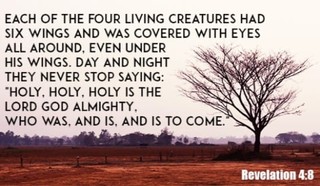
- Recent Translations
- All Translations
Revelation 4:11
Share
Settings
Images for Revelation 4:11

Revelation 4:11 Meaning and Commentary
Thou art worthy, O Lord, to receive glory honour, and
power
The Alexandrian copy, and some others, the Complutensian edition, the Vulgate Latin version, and all the Oriental ones, read, "thou art worthy, O Lord, and our God, to receive"; that is, to receive the acknowledgment and ascription of glory, honour, and power; for otherwise God cannot be said to receive these from his creatures, than by their confessing and declaring that they belong unto him: and that for the reasons following,
for thou hast created all things;
the whole universe, the heavens, the earth, and sea, and all that in them are:
and for thy pleasure they are and were created;
God is the first cause, and the last end of all things; by his power they are made, and according to his will, and for his own glory, and therefore is worthy of such a doxology; see ( Proverbs 16:4 ) ( Romans 11:36 ) . What is here said is contrary to a notion imbibed by the Jews F26, that the world was not created but for the sake of the Israelites: and elsewhere F1 they say,
``the world was not created but for David; and one says for Moses; and Rabbi Jochanan says for the Messiah;''which last is truest.
F26 Zohar in Exod. fol. 6. 3. & Tzeror Hammor, fol. 109. 1. & 161. 3.
F1 T. Bab. Sanhedrin, fol. 98. 2.